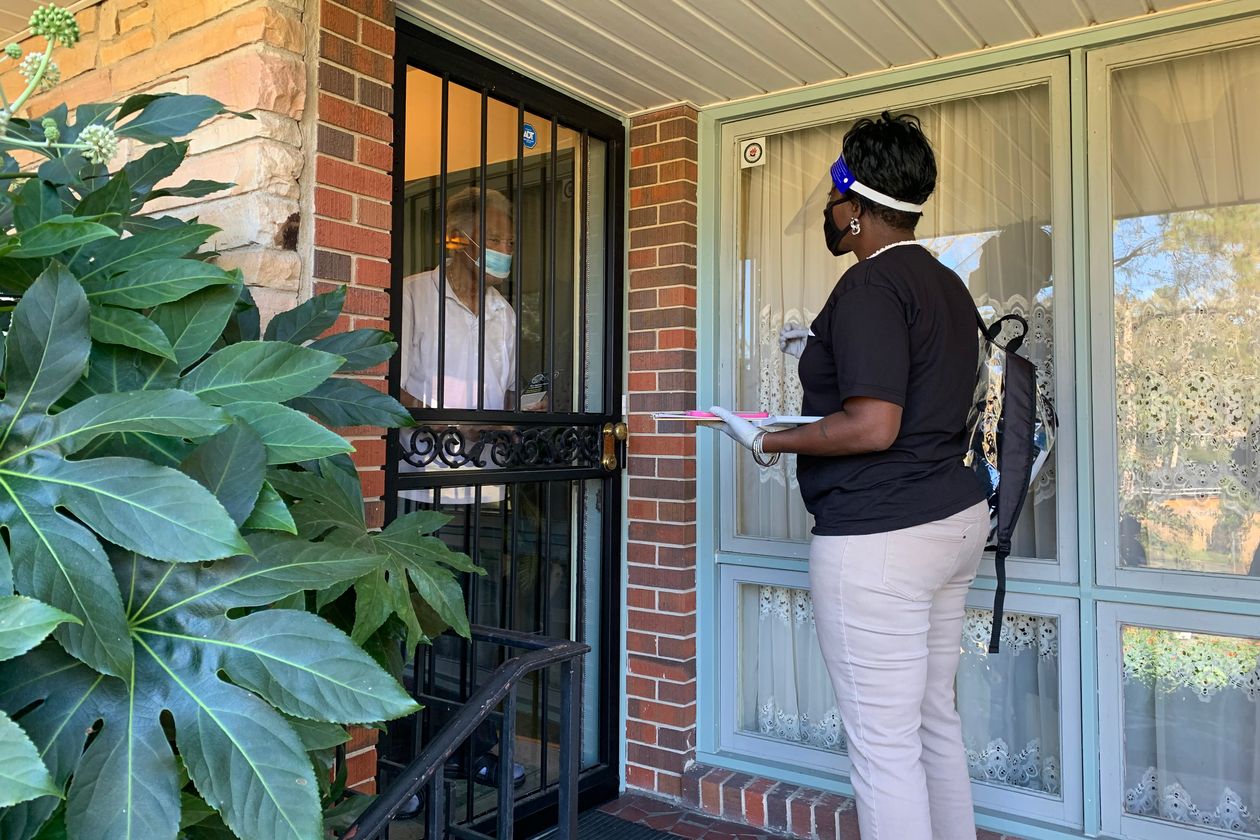Republicans and Democrats have concluded that the outcome of two runoff races here, which will determine control of the Senate, may well hinge on how their supporters reacted to November’s presidential result.
Both sides have reason for concern.
Republicans worry that disillusioned backers of President Trump, convinced the system is rigged against them, in large part because of the president’s own pronouncements, will stay home. Democrats are wringing their hands over whether suburban and urban voters, motivated in November by the desire to oust Mr. Trump, will declare mission accomplished and not return to the polls on Jan. 5.
Both parties are conducting what they describe as enormous voter turnout operations—not only because so much is at stake for both sides, but because they’re fretting about turning out their own people when Mr. Trump is not on the ballot. So far, campaigns and outside groups are on track to spend more than $415 million on television and radio advertising, the most ever for a Georgia runoff, according to political ad tracker Kantar/CMAG.
“Normally people say don’t preach to the choir, but in a runoff you want to not just preach to the choir, but sing lovingly to them,” said Tim Phillips, president of the Virginia-based conservative group Americans for Prosperity, during a recent door-knocking trip in the GOP stronghold of Cherokee County. “Even a drop-off of 8 or 10 percent out here…in our base, could be deadly.”
Democrats had curtailed face-to-face turnout operation during the general election because of the pandemic. Now, they have concluded the prospects of winning two Senate seats and control of the chamber outweigh the potential health risks, which they are mitigating with masks and distancing.
“We’re going to have to do door knocking now,” said Nabilah Islam, a Georgia Democratic organizer who recently created Save our Senate PAC, a super PAC focused on boosting turnout on the left for the two runoffs. “We’ve realized that we can’t forgo direct voter contact.”
Turnout is especially important in the Georgia runoffs given their unique circumstances. Runoff elections here have long favored Republicans because Democratic turnout has tended to decline in the second-round of voting. A nonpartisan study of runoffs in Georgia found that, going back to 1988, Democrats have won just one of seven statewide runoff elections.
Georgia Democrats have spent years trying to rebuild their party to become competitive in what has been a reliable red state. An influx of younger and diverse residents, who tend to lean Democratic, has fueled those efforts.
In 2010, white voters represented more than 61% of those registered in Georgia. By 2020, that percentage had fallen to 53% as registrations among Black, Latino and Asian voters boomed. Total registered voters climbed from 5.8 million in November 2010 to an all-time high of 7.5 million last month.
Hillary Clinton lost Georgia to Mr. Trump by 5.7 percentage points in 2016, an improvement on President Obama’s performance in the state in 2012. In 2018, Stacey Abrams, the Democrats’ nominee for governor and a leader of the left’s voter-registration push, got even closer to a statewide victory, losing to Republican Brian Kemp by just 1.4 percentage points.
In November, Mr. Biden beat Mr. Trump by a razor-thin 0.26 percentage points, or about 12,000 votes out of five million cast—a win certified by GOP officials in Georgia after recounts. Mr. Biden won by running up wide vote margins in more populated areas, such as metropolitan Atlanta, Savannah and Columbus, beating strong turnout for Trump in rural parts of the state.
The runoff Senate races will likely come down turnout in areas where the parties saw improvement on their support compared with the 2016 presidential election. Democrats are looking to urban cores, such as Middle Georgia and metropolitan Atlanta, as Republicans look to rural pockets.
In one of the Senate runoffs, Republican Sen. David Perdue faces Democrat Jon Ossoff, a documentary filmmaker. In the other, Sen. Kelly Loeffler, who was appointed to fill the seat of retired Sen. Johnny Isakson, is competing against Democrat Raphael Warnock, pastor of Dr. Martin Luther King Jr.’s former church. In Georgia, Senate candidates must win with more than 50% of the vote or face a runoff, which is what happened in November.
Both parties see control of the Senate as essential in determining not just how much Mr. Biden is able to do as president, but the fundamental direction of the nation.
The incoming Senate currently has 50 Republicans and 48 Democrats. If Democrats win both races, they will gain control because Vice President-elect Kamala Harris could cast a tiebreaking vote. If Democrats lose one of the races, Republican Mitch McConnell of Kentucky will retain his title of Senate majority leader.
That is why Mr. Phillips has been knocking on doors on behalf of the conservative group Americans for Prosperity.
Teresa Weinelt was scrubbing her bathtub on a recent afternoon when Mr. Phillips walked up her driveway in a wooded residential neighborhood to urge her to vote for Mr. Perdue.
Ms. Weinelt, 59 years old, told Mr. Phillips she was sick of the never-ending election, which has brought a deluge of ads on her television. “It drags on and on and on and on,” she said. “I just wish it would be over.”
She was impressed, though, that Mr. Phillips was the first person to show up at her door. She promised she and her husband would vote for Mr. Perdue.
Black PAC, a national super PAC that works to boost turnout among Black Democrats, sent organizers into local businesses in Columbus, Ga., to drop off literature supporting the two Democrats.
Adrianne Shropshire, executive director of the PAC, said internal polling showed that ousting Mr. Trump was one of the biggest motivators for Black Democratic voters in the state. The mission now, she said, is to pivot to “the idea of the need to finish the job, that removing Trump is only part of the job, and getting rid of people who essentially stand in the way of progress is the second part of the job.”
Using voter data, Black PAC aims to visit the homes of Black residents such as James Bussey and his daughter, Janet, in Columbus.
An organizer handed a masked Ms. Bussey a flier that read, “Vote. AGAIN,” with instructions for how to do so in the runoffs. Ms. Bussey, 70, says she will vote for Messrs. Ossoff and Warnock because she wants Mr. Biden to have a meaningful presidency.
“When Obama was president, we got very little done because he didn’t have a lot of support in the Senate,” she said. “It doesn’t do anything to get Biden and Harris in there if there’s no one in the Senate who will listen to them.”
Mr. Trump and the GOP senators he is campaigning for have cast the runoff races as a way to avenge what the president describes as a flawed electoral process, as well as to be a last line of defense against complete Democratic control in Washington. “Let me tell you, this election was rigged, and we can’t let it happen to two of the greatest, most respected people in Washington,” Mr. Trump said in a Georgia visit on Dec. 5, alongside Mr. Perdue and Ms. Loeffler. “We can’t let it happen again.”
Some Republicans worry that the president’s continued attacks on the legitimacy of the election results and the leadership of the state GOP also could erode Republican turnout. Georgia Secretary of State Brad Raffensperger, a Republican, has conducted two recounts and a by-hand audit of ballots to verify Mr. Biden’s win, and those results were certified by Republican Gov. Brian Kemp. Both said there was no evidence of widespread fraud, a message echoed by U.S. Attorney General William Barr and the Homeland Security Department.
Sen. Ted Cruz (R., Texas), who is planning a bus tour in Georgia to drum up support for his GOP colleagues, said, “There is a real risk that Democrats will be united—united by their hatred of President Trump—and there is a risk that Republicans will be divided because of frustrations over where the presidential race stands right now.”
On social media, some people claiming to be Trump backers have called for voters to write in Mr. Trump’s name on the runoff ballot or boycott the contest altogether to punish the Republican establishment.
A website claiming to be sponsored by a group linked with longtime Trump ally Roger Stone called on voters to write in the president’s name on their ballots. Asked by The Wall Street Journal about the claimed connection, Mr. Stone said via email that the website was fake. “I was used for clickbait in a smear campaign designed to hurt Republican chances of winning,” he said.
The runoff ballot doesn’t include a space to write in other candidates, election officials said.
Atlanta lawyer L. Lin Wood, who argued one of Mr. Trump’s unsuccessful legal election challenges, told a rally crowd they should sit out the runoffs to protest the presidential election results. “Why would you go back and vote in another rigged election, for God’s sake?” he said.
Canvassing in the southern part of the state, Mr. Phillips said he encountered Republican voters who saw little point in voting now. “I had one guy say to me, ‘What’s the point? We lost Trump,’ ” he said.
On a recent weekday, Mr. Phillips and other GOP activists visited neighborhoods in Cherokee County, which has voted Republican in every presidential election beginning with Ronald Reagan’s second term in 1984.
Hunter Armstrong, 72, said he strongly supported Mr. Trump but was less trusting of other Republicans. He said he planned to vote for Mr. Perdue but wasn’t sure about Ms. Loeffler.
“There’s a lot of RINOs running around,” he said, using the pejorative expression for Republicans-in-name-only. “Why not just split the United States and let them have their green pastures and we’ll keep the NRA. We’ll keep the military. We’ll keep everything they don’t like,” he said, referencing the National Rifle Association.
Democrats, too, are grappling with how Mr. Trump’s rhetoric will affect their turnout. At Sugga’s, a soul food restaurant in Democratic-leaning Columbus, Black PAC activists left literature about Messrs. Warnock and Ossoff at the register next to menus.
Cassandra Ryan, a Sugga’s owner, said some customers and family members have interpreted Mr. Trump’s allies’ efforts to undermine the results of the presidential election as a sign that their vote might not count—and a rationale to stay at home. “Some people can’t see beyond, ‘My vote doesn’t count.’ I try to tell people it always makes a difference,” she said.
Ms. Ryan said she tells customers, including her oldest brother, who isn’t planning to vote in the runoffs: ”I’m going to go back and vote. I’m looking at the big picture. I’m not looking at Trump anymore.”
Kim Sowels, who voted for Messrs. Warnock and Ossoff in November, is now considering canvassing on behalf of the Democrats during the runoff. Ms. Sowels said she was unaware of the runoff race until Democratic canvassers urged her to vote for the pair one more time. She wanted to keep passing the word.
“People perish for lack of knowledge,” she said.


Recent Comments